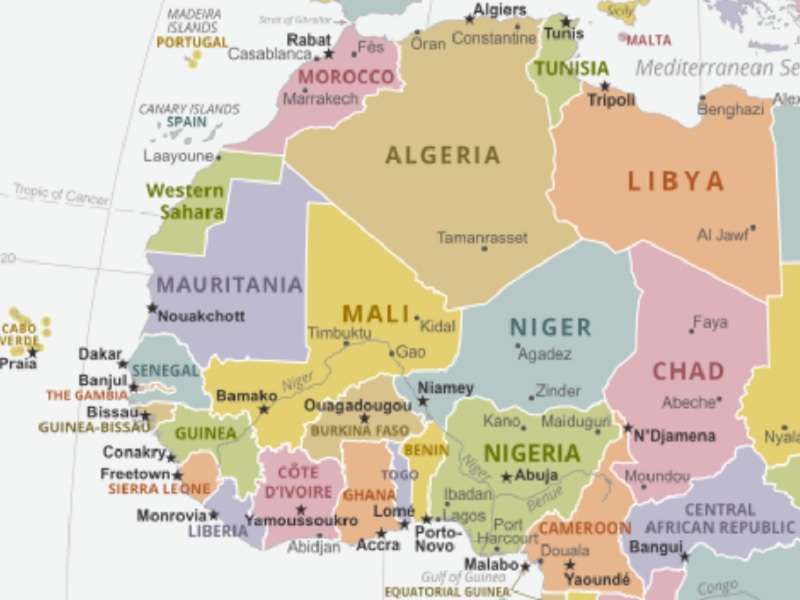RT reported that the Foreign Ministers of Mali, Burkina Faso, Niger, and Chad, the first three of whom just agreed to transform their military alliance into a confederation, met in Marrakech where they expressed their support for Morocco’s plans to help them achieve reliable access to the sea. Chad technically already has such access via Cameroon, which hosts an Exxon pipeline to the Gulf of Guinea, but N’Djamena’s nationalization of its assets and Yaounde’s separatist struggles could complicate this.
Since Sudan is still mired in war, Nigerian-led ECOWAS remains at odds with the Sahelian Confederation, Boko Haram threatens Chadian-Nigerian trade, and trans-Saharan trade to the Mediterranean is very dangerous, Morocco offered them all access to the sea via its territory. This could most easily be achieved via the Western Sahara region and facilitated by the Kingdom’s infrastructure investments there, but this plan is more ephemeral than practical.
The largely frozen but nevertheless still existing separatist conflict over that region forms the greatest political obstacle while Mauritania’s interest in playing this exact same role instead of Morocco is the greatest geo-economic one. Although those neighboring countries have solid relations, Mauritania recognizes the Polisario Front’s “Sahrawi Arab Democratic Republic” (SADR) that controls a strip of the border with Morocco and was also conspicuously absent from last weekend’s Foreign Ministers meeting.
Associate fellow at the Royal United Services Institute Samuel Ramani published a detailed piece in Foreign Policy magazine a few months back about “Why Everyone Is Courting Mauritania”, which should be read in full to bring everyone up to speed about this country’s geostrategic significance. He accurately assessed that “NATO, China, Russia, and regional powers all want closer ties to a stable West African nation with crucial energy supplies and a strategically valuable location.”
For Morocco’s plan to work, the Western Sahara conflict would have to officially end and Mauritania would have to abandon its own possible plans to directly facilitate the Sahelian Confederation’s access to the sea, both of which are unlikely anytime soon if at all. This pessimism is correspondingly due to Algeria’s patronization of the Polisario Front as part of its long competition with Morocco for regional influence and Mauritania’s interests in profiting from global trade with the confederation and Chad.
Regarding the first, any resumption of large-scale conflict between Morocco and the Polisario Front always risks the possibility of Algeria’s direct involvement to save its partners from full defeat, which has thus far deterred Rabat. As for the second, the previously mentioned powerful actors’ courtship of Mauritania could lead to the foreign investment required to modernize its own logistics and therefore facilitate the Sahelian Confederation’s access to the sea in place of Morocco, even though it’ll take time.
All told, there are two primary trends are play: rapidly accelerating regional integration processes as epitomized by the Sahelian Confederation and an emerging competition over which coastal state(s) will facilitate this bloc’s reliable access to the sea. If the first remains on track and isn’t offset through Western subterfuge, then Nigerian-led ECOWAS might finally recognize this geopolitical reality and remove the group’s restrictions on this bloc in order to profit from facilitating its global trade.
Should Abuja refuse to do so for whatever reason, seeing as how everything that it’s done so far with respect to its northern neighbors has been counterproductive to its interests, then the Sahelian Confederation would have to rely on either Mauritania-Morocco and/or Guinea. The first’s difficulties were already described, which is why the rest of the piece will be rounded out by describing the second’s potential in this regard since France’s Senegalese bastion is ruled out for obvious political reasons.
Guinea was also suspended from ECOWAS after its own patriotic military coup in 2021 and then defied that group to keep its border with Mali open in 2022 after its neighbor’s most recent coup the year later. Its interim military-led authorities are also committed to a pan-African vision just like the Sahelian Confederation, though it’s unclear why it didn’t join that bloc or its military pact. In any case, Guinea is much more politically reliable that Nigeria even in the event that the latter reopens its border with Niger.
For these reasons, the Sahelian Confederation would do well to prioritize access to the sea via Guinea instead of Nigeria or Mauritania-Morocco, to which end they should work closely with one another and their Russian partner to make that country an enticing offer to join their regional integration network. Nigeria can always return to blackmailing that bloc on whatever pretext, while Mauritania lacks the infrastructure to facilitate this, and Morocco is unlikely to resolve its dispute with the Polisario Front.
Trans-Saharan trade can’t be conducted at scale even though some limited amount thereof could still serve as a lifeline if needed, which in turn disqualifies Algeria and Libya in any theoretical scenario, thus further reaffirming the importance of Guinea playing this role. Few could have foreseen just a few years ago that this country could occupy such a pivotal geostrategic position, but that’s precisely what happened as a result of the multipolar processes that were unleashed by Russia’s special operation.
